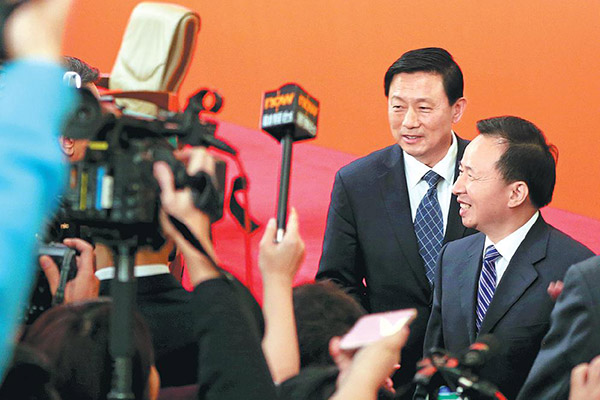
Li Ganjie, minister of environmental protection (right), responds to additional questions from reporters after a news conference at the 19th National Congress of the Communist Party of China in Beijing on Oct 23.[Photo by Feng Yongbin/China Daily]
China will see fundamental improvements in its environmental quality by 2035, when the average PM2.5 concentration in the air nationwide will meet the national standard, Minister of Environmental Protection Li Ganjie said on Oct 23.
“We are conducting studies to clarify the details of the fundamental improvement, but I think, in the field of air quality, it means the national average PM2.5 level will be lowered to 35 micrograms per cubic meter,” said Li Ganjie, minister of environmental protection, at a news conference on the sidelines of the 19th National Congress of the Communist Party of China.
PM2.5 refers to hazardous fine particulate matter in the air. The 35 microgram per cubic meter concentration is one of major indexes used to describe air quality.
In some major areas which have severe air pollution, the average PM2.5 level will also be lowered, Li said.
The latest data from the Ministry of Environmental Protection show that 338 cities across the country saw average PM2.5 concentrations of 47 micrograms per cubic meter last year, 34.3 percent higher than the standard.
“It’s not easy to reach the targets,” Li said. In fact, air pollution worsened in some areas, he added.
The Beijing-Tianjin-Hebei province region, along with neighboring provinces, experienced severe air pollution in past years, especially in autumn and winter. The ministry has introduced stronger measures to reduce the air pollution in those areas.
Stricter measures governing discharges have been introduced to reduce emissions. Some heavy industries, for example, such as steel and cement manufacturing, will suspend production, and vehicles with heavy exhaust emissions will be restricted, documents from the ministry indicated.
Total emissions reduced in the winter months are estimated at double or triple what was cut last winter to help governments reach their air pollution reduction targets, the documents showed. “We will try our best to win the fight against air pollution,” Li said.
Hebei, in which at least six cities ranked among the top 10 cities with the worst air pollution, has promised to strengthen restrictions, said Gao Jianmin, head of the provincial environment department, on Oct 23.
For example, Hebei restricted the coal consumption in rural areas for heating service, “over 1.8 million households will switch to use clean energy-the electricity or natural gas, for heating,” he said, adding “It’s estimated to cut the consumption of 4.8 million metric tons of coal.”
“At least 100,000 small and polluting companies have been ordered to pause their production or shut down altogether this year, which will cut emissions,” Gao said.
“Air pollution has been our top priority, and anyone violating the restrictions-in a company or government-will receive severe punishment.”
